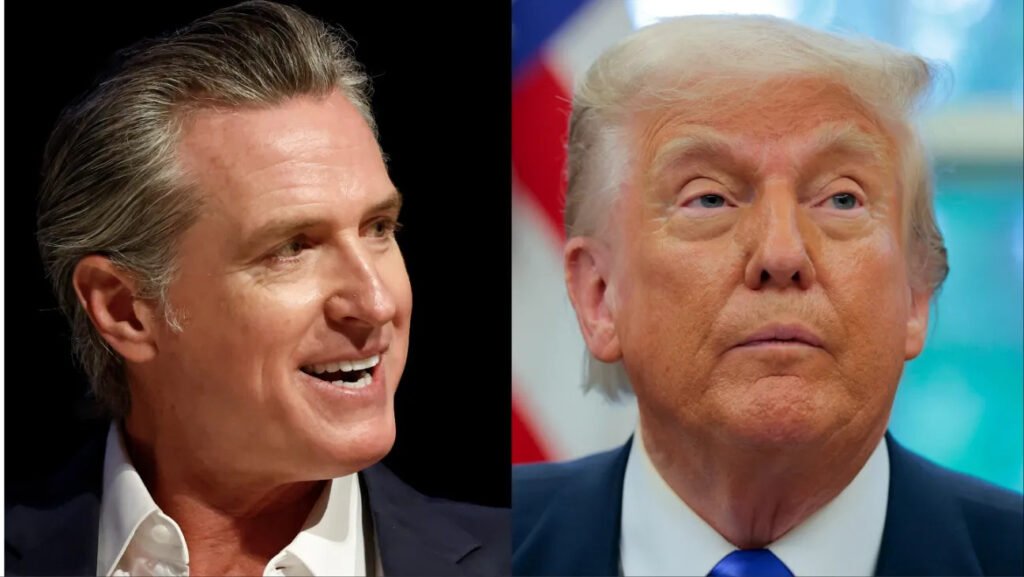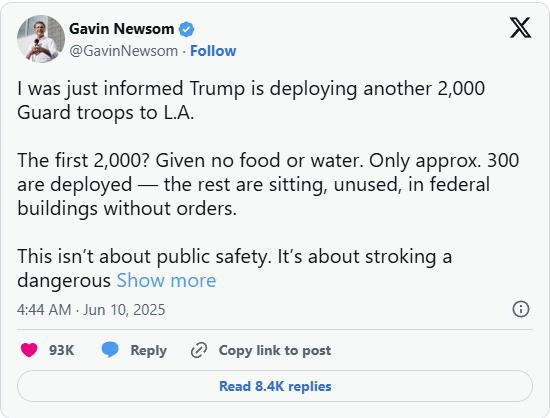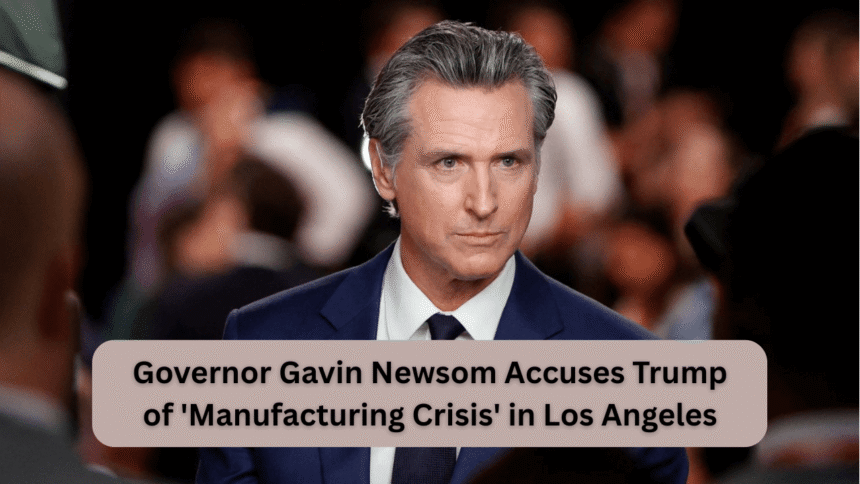California Governor Gavin Newsom has launched a scathing critique against President Donald Trump, alleging that Trump is “manufacturing a crisis” in Los Angeles. This accusation comes amidst a heated dispute over the unilateral deployment of National Guard troops to the city. The standoff marks a significant escalation in the ongoing political friction between Gavin Newsom and the former president, drawing national attention to issues of state sovereignty and federal overreach. Gavin Newsom firmly stated that the federal deployment lacks necessity and only serves to inflame an already tense situation. The actions by the Trump administration, according to Gavin Newsom, bypassed established protocols and ignored the state’s capacity to manage its own affairs.
The Unilateral Deployment and Mounting Tensions
The controversy began when the Trump administration announced the deployment of approximately 2,000 National Guard troops to Los Angeles. This decision, made without direct consultation or request from California’s Governor, immediately sparked outrage within state leadership. Federal officials stated the deployment aimed to quell protests related to immigration enforcement actions. These demonstrations, which started after a series of Immigration and Customs Enforcement (ICE) raids, saw clashes between some protesters and law enforcement. Vehicles were vandalized, and authorities used crowd control measures.
However, state officials, including Governor Gavin Newsom and Los Angeles Mayor Karen Bass, maintained that local law enforcement had the situation under control. They argued that the federal intervention was unwarranted. “Los Angeles authorities can access law enforcement assistance instantly,” Governor Newsom emphasized. “There is no unmet need right now.” He accused the Trump administration of orchestrating a spectacle rather than genuinely assisting with public safety.
Gavin Newsom’s Legal Offensive and Constitutional Arguments
In response to the federal action, Governor Gavin Newsom swiftly announced California’s intention to sue the Trump administration. State Attorney General Rob Bonta joined the lawsuit, arguing that the federal takeover of the California National Guard unit was unconstitutional and violated state sovereignty. The lawsuit specifically cited U.S. Code Title 10, asserting that it requires gubernatorial consent for such federalization. State leaders contend that Trump’s order circumvented this critical legal requirement.

“This is an illegal act, an immoral act, an unconstitutional act,” Gavin Newsom declared in public statements. He articulated concerns that the deployment aimed to inflame tensions for political gain. The lawsuit seeks a restraining order to prevent the continued federal control of the National Guard, highlighting the potential for widespread implications if a president can unilaterally command state militias. Governor Newsom warned that if unchallenged, this precedent could allow a federal takeover of state National Guard units across the nation.

California’s legal challenge underscores a fundamental dispute over the balance of power between state and federal governments. State officials assert that the situation in Los Angeles did not meet the criteria for federal intervention, such as a foreign invasion or rebellion, which typically justify such actions without state consent. They emphasized that peaceful protest is a cornerstone of democracy, and that the federal government’s actions threatened this right.
Trump’s Retaliation and Accusations
President Donald Trump quickly fired back at Gavin Newsom. He defended the National Guard deployment, claiming that Los Angeles would have been “completely obliterated” without federal intervention. Trump asserted that state and local leaders were “incompetent” and incapable of managing the unrest. He also publicly suggested that it would be “a great thing” if his “border czar,” Tom Homan, were to arrest Gavin Newsom for supposedly obstructing federal efforts.

Trump’s comments, including the suggestion of arresting a sitting governor, drew strong condemnation from Gavin Newsom. The Governor described Trump’s remarks as “a day I hoped I would never see in America” and characterized them as an “unmistakable step toward authoritarianism.” He challenged Homan to “come and get me, tough guy,” underscoring his defiance. Trump and his allies continued to accuse Gavin Newsom of failing to control the protests and of prioritizing political posturing over public safety. They argued that the federal presence was necessary to protect federal personnel and property.
Impact on Los Angeles and Public Reaction
The presence of federal troops and the escalating political rhetoric has created a climate of uncertainty and heightened anxiety in Los Angeles. While some residents welcomed the federal intervention, others expressed concern that it would further militarize the city and exacerbate tensions. Protestors, many of whom were demonstrating peacefully against immigration policies, voiced fears of increased confrontation and surveillance. Local law enforcement leaders also emphasized the need for clear communication and coordination with all agencies involved.
News reports indicated that some of the deployed National Guard troops initially lacked clear orders or sufficient logistical support. This fueled arguments that the deployment was more about optics than effective crowd control. The situation also brought renewed focus on the broader issue of immigration enforcement and its impact on communities. Activist groups criticized the federal raids as unjust and called for de-escalation from all sides.
Broader Implications: State Sovereignty and Political Showdown
This high-profile dispute between Gavin Newsom and Donald Trump extends beyond California’s borders, raising significant questions about state sovereignty and the limits of federal power. Legal experts are closely watching the lawsuit, as its outcome could set precedents for how future administrations interact with state governments during periods of unrest. The case tests whether a president can deploy National Guard units without a governor’s consent, particularly when the stated reason is to address protests rather than an explicit insurrection or emergency.
The conflict also highlights the intensifying political divisions in the United States. Governor Newsom, a prominent Democrat often seen as a potential future presidential contender, positions himself as a leading voice against what he perceives as Trump’s authoritarian tendencies. For Trump, the confrontation allows him to energize his base by demonstrating a “tough on crime” stance and criticizing Democratic leadership. The escalating rhetoric and legal battle underscore a fundamental ideological clash over governance and civil liberties.
The Road Ahead
As the lawsuit proceeds, the immediate future of the National Guard deployment in Los Angeles remains uncertain. The courts will determine the legality of Trump’s actions and the extent of a president’s authority to federalize state forces. Regardless of the legal outcome, the political fallout from this confrontation will likely persist. Gavin Newsom continues to advocate for California’s right to self-governance and to challenge actions he views as an overreach of federal power.
The dispute also serves as a potent reminder of the complexities inherent in managing civil unrest and enforcing federal law within a federal system. It highlights the delicate balance required between maintaining order and protecting constitutional rights. Both sides appear prepared for a prolonged battle, ensuring that the conflict between Governor Gavin Newsom and President Donald Trump remains a major topic in national discourse.
Also read: Las Vegas Strip Shooting: YouTuber Feud Turns Deadly Near Tourist Hotspot

